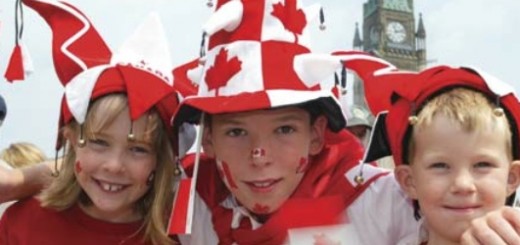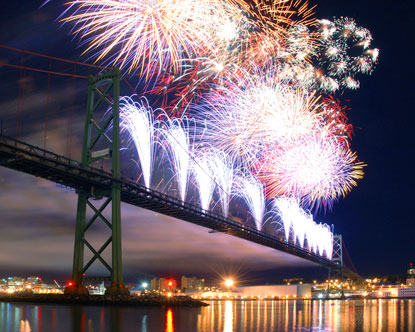- Study in AustraliaAustralian Universities/CollegesPrograms by faculty AusAustralian VisasLife in Australia
- Study In New ZealandNew Zealand UniversitiesPrograms by Faculty NZNew Zealand VisasLife in New Zealand
- Study in CanadaUniversities/Colleges in CANADAPrograms by faculty CanadaCanadian VisasLife in Canada
Holidays and Celebrations
| Holidays and Celebrations | |||
| Though Canada is a secular country and there is separation between church and state, Canada was founded by men and women, the majority of whom were Christians. There are many different cultures and religions in Canada now, but the largest religion in Canada is still Christianity and Canada still observes many Christian holidays. There are two different kinds of holidays in Canada. The first is a statutory holiday, where it is illegal to force people to work on that day. People may still work if they wish, but their employers must pay them a higher-than-normal rate of pay. The second kind of holiday is more of a celebration or a day of reflection. These may be holidays that used to be statutory but are no longer, though banks and government offices may still be closed on those days. They may just mean that people may observe certain customs or practices. | | ||
 | |||
Most people do not have to work on Saturday throughout the year, but people who work in retail stores and restaurants do have to work on weekends. Banks and government offices are usually closed on this day, though there is no law saying that people must be given these days off. Sundays are a different story, as traditionally Sunday was the day that Christians attended religious ceremonies. Banks and government offices are closed. In some provinces, many types of businesses are not permitted to be open, while in others, almost all private businesses, especially those in retail, are open.
This is a statutory holiday that most Canadians do not work. The day itself is used primarily for recovering from the parties that most people attend the night before to celebrate the coming of the new year.
This holiday came about from a Christian celebration of Saint Valentine. However, people still work on this holiday and it has lost most of its religious significance. Now it is a celebration of love and romance, marked by couples exchanging gifts or going out for romantic meals. Children may be given gifts of chocolate and candy.
This is a statutory holiday. The actual date for Good Friday changes from year to year because it occurs on the Friday after the appearance of the first full moon after the spring equinox (March 21). This holiday is to commemorate the day that Christians believe that Jesus was crucified and died for the sins of humanity. Canadians who are Christian may attend a religious service on this day.
The actual date for Easter Sunday changes from year to year because it occurs on the Sunday after the appearance of the first full moon after the spring equinox (March 21). Most business across the country, including retail, are closed on this day. Some restaurants, pharmacies and corner or convenience stores may be open. This is a happy day for Christians, for it celebrates Jesus' resurrection. Families go to church and gather to have a larger dinner, usually serving ham or turkey. Even people who are not very religious gather and celebrate Easter. Children are given gifts of chocolate in the shape of rabbits or eggs. Children may also decorate boiled chicken eggs (still in the shell) with paint or dyes.
The actual date for Easter Monday changes from year to year - it occurs the day after Easter Sunday. Banks and government offices are closed on this day, but most other businesses are open. Activities are similar to the ones people take part in on Easter Sunday.
This is a statutory holiday, often referred to as "May 24" or "May two-four" by Canadians because it celebrates the birthday of Queen Victoria (May 24, 1837). Canadians celebrate by having or attending public fireworks displays.
A statutory holiday, Canada Day commemorates the day in 1867 that the first of the British North American colonies entered Confederation as the Dominion of Canada. Canadians celebrate by having or attending public fireworks displays.
On this statutory holiday, Canadians celebrate the contributions of labour to Canadian society. There are very few public activities to take part in. The day usually marks the end of the summer holidays for students.
Some say that immigrants from the United States brought this holiday with them to Canada in the 18th century. As in the United States, the holiday celebrates the fall harvest, but it occurs earlier in the year to reflect the earlier harvest time in Canada. This is a statutory holiday where families gather for dinner, often having turkey or ham.
An old pagan festival that has had all the pagan religious overtones taken out of it, Halloween is not a holiday that anyone in Canada is given time off work for, though some people take time off to celebrate. Primarily an event for children, Halloween marks the time where Canadians enjoy the supernatural and the scary, even though most of them do not believe in the supernatural. Children dress up as monsters such as witches, vampires or werewolves, as fictional characters or figures from popular culture. They then go door-to-door in their neighbourhoods. Younger children are accompanied by their parents. At each house, they yell or say "trick or treat", and are usually rewarded with a treat in the form of candy. Sometimes the neighbours indulge themselves in tricks, carving scary faces into pumpkins or decorating their house as a place haunted by spirits. But everything is meant in fun and children are usually not scared too badly. And even these frights can be overcome by the offer of a chocolate bar. Older children and adults celebrate Halloween by having parties where they too dress up as monsters or popular figures from culture.
On this day, banks and government offices are closed, but almost everything else, including schools, remains open. This day is used to commemorate the Canadians who died in the wars and police actions that Canada has been involved in the 20th and 21st century, including World Wars I and II and the Korean War. At 11 a.m. on November 11, Canadians observe a moment of silence. Poppies made of felt are worn on jackets or shirts. This recalls the poppies that grew on the graves of the fallen soldiers in World War I and featured the poem In Flanders Fields by Canadian John McCrae.
This is a celebration of the birth of Jesus, though many people who are not Christian celebrate this statutory holiday. The religious will attend church or other religious services while others will stay at home with their families. Many Canadian families, religious or otherwise, exchange gifts on Christmas day and decorate a Christmas tree in the weeks leading up to Christmas. A Christmas tree is usually an evergreen tree (pine or spruce) that has been cut down to be about 1.5 - 2 metres (5 - 7 feet) tall. The tree is brought indoors and decorated with lights and ornaments. Gifts, to be opened on Christmas Day, are placed underneath the boughs of the tree. Children in Canada look forward to Christmas as the day that Santa Claus will bring them gifts. On Christmas Eve (the night before Christmas Day), children hang up stockings on the fireplace. If the family does not have a fireplace, the stockings can be hung anywhere. During the night Santa comes and rewards the children who have been good all year by leaving them toys in the stocking. Of course, all the children who hang their stockings will receive toys in their stockings, put there by their parents. But don't tell any children this! Many of them do not know that there is no Santa Claus and people prefer to let them believe until they are a little older. In fact, the Canadian post office provides an address for Santa Claus so that children can mail him letters.
This statuary holiday is used by most Canadians to travel back home from visiting their families on Christmas Day, or just as a day to relax. Some retail stores are open with special Boxing Day sales, but on the whole most businesses, barring entertainment venues like restaurants, hotels and theatres, are closed.
Canadians gather on New Year's Eve to celebrate the end of the old year and usher in the new one. Most Canadians are allowed to leave work a couple of hours early in order to get to the parties they are attending. A ritual that many people practice is the making of New Year's resolutions; they promise that they will take some action to improve themselves over the coming year. A common resolution is to lose weight and get into better physical shape, but all kinds of promises are made. At parties or public events, an official timekeeper will count down the actual minutes and seconds remaining in the old year. When the clock gets to 10 seconds remaining, the crowd will count out the final moments together out loud. When the clock reaches zero, people cheer, and use noisemakers to show their enthusiasm for the upcoming year. It is customary for couples and friends to kiss at the birth of the new year. | |||
For more information, please contact one of our offices
Study in Australia | Study in the UK | Study in Malaysia | Study in Canada | Study in the USA | Study in New Zealand














